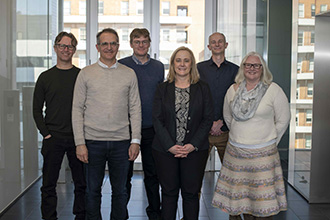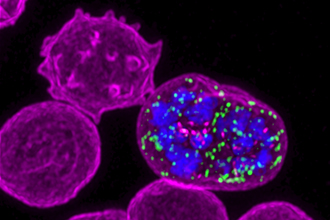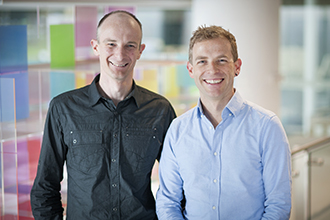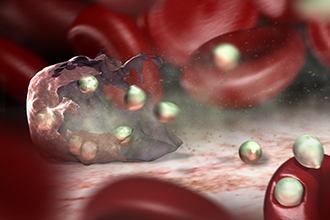Favuzza P, Palandri J, de Lera Ruiz M, Bailey W, Boyce CW, Danziger A, Fawaz MV, Kelly M, Murgolo N, Robbins JA, Vavrek M, Zhao L, Lei Z, Guo Z, Reaksudsan K, Steel RWJ, Hodder AN, Ngo A, Dziekan JM, Thompson JK, Triglia T, Birkinshaw RW, Penington JS, Scally SW, Dans MG, Coyle R, Sevilleno N, Orban A, Feufack-Donfack LB, Popovici J, Lee MCS, Papenfuss A, Lowes KN, Sleebs BE, McCarthy JS, McCauley JA, Boddey JA, Olsen DB, Cowman AF. MK-7602: a potent multi-stage dual-targeting antimalarial. EBioMedicine. 2026;123:10.1016/j.ebiom.2025.106061
Mansouri M, Dans MG, Low Z, Loi K, Jarman KE, Penington JS, Qiu D, Lehane AM, Crespo B, Gamo F, Baud D, Brand S, Jackson PF, Cowman AF, Sleebs BE. Exploration and Characterization of the Antimalarial Activity of Pyrimidine‐2,4‐Diamines for which Resistance is Mediated by the ABCI3 Transporter. ChemMedChem. 2026;21(1):10.1002/cmdc.202500739
Su W, Nguyen W, Siddiqui G, Dziekan JM, Marapana D, Penington JS, Mehra S, Razook Z, McCann K, Ngo A, Jarman KE, Barry AE, Papenfuss AT, Gilson PR, Creek DJ, Cowman AF, Sleebs BE, Dans MG. Deconvolution of the On-Target Activity of Plasmepsin V Peptidomimetics in Plasmodium falciparum Parasites. ACS Infectious Diseases. 2025;11(12):10.1021/acsinfecdis.5c00742
Mao EY, Nguyen W, Jana GP, Maity BC, Pazicky S, Giannangelo C, Reader J, Famodimu MT, Birkholtz L-M, Delves MJ, Creek DJ, Bozdech Z, Laleu B, Burrows JN, Sleebs BE, Gancheva MR, Wilson DW. Characterizing the quick-killing mechanism of action of azithromycin analogs against malaria parasites. Antimicrobial Agents and Chemotherapy. 2025;69(9):10.1128/aac.01783-24
Nguyen W, Boulet C, Dans MG, Loi K, Jarman KE, Barnes CBG, Yeo T, Sheth T, Mukherjee P, Chakraborty A, Famodimu MT, Delves MJ, Pollard H, Sutherland CJ, Coyle R, Sevilleno N, Boonyalai N, Lee MCS, Rabie T, Birkholtz L-M, Baud D, Brand S, Chowdury M, de Koning-Ward TF, Fidock DA, Gilson PR, Sleebs BE. Optimization and Characterization of the Antimalarial Activity of N‑Aryl Acetamides that are Susceptible to Mutations in ROM8 and CSC1. Journal of Medicinal Chemistry. 2025;68(15):10.1021/acs.jmedchem.5c01471
Mao EY, Page SW, Sleebs BE, Gancheva MR, Wilson DW. A review of natural products as a source of next-generation drugs against apicomplexan parasites. npj Antimicrobials and Resistance. 2025;3(1):10.1038/s44259-025-00119-x
Hodder AN, Sleebs BE, Adams G, Rezazadeh S, Ngo A, Jarman K, Scally S, Czabotar P, Wang H, McCauley JA, Olsen DB, Cowman AF. Structure–activity analysis of imino‐pyrimidinone‐fused pyrrolidines aids the development of dual plasmepsin V and plasmepsin X inhibitors. The FEBS Journal. 2025;292(11):10.1111/febs.70038
Awalt JK, Ooi ZK, Ashton TD, Mansouri M, Calic PPS, Zhou Q, Vasanthan S, Lee S, Loi K, Jarman KE, Penington JS, Qiu D, Zhang X, Lehane AM, Mao EY, Gancheva MR, Wilson DW, Giannangelo C, MacRaild CA, Creek DJ, Yeo T, Sheth T, Fidock DA, Churchyard A, Baum J, Famodimu MT, Delves MJ, Kristan M, Stewart L, Sutherland CJ, Coyle R, Jagoe H, Lee MCS, Chowdury M, de Koning-Ward TF, Baud D, Brand S, Jackson PF, Cowman AF, Dans MG, Sleebs BE. Optimization and Characterization of N‑Acetamide Indoles as Antimalarials That Target PfATP4. Journal of Medicinal Chemistry. 2025;68(8):10.1021/acs.jmedchem.5c00614
Shanley HT, Wang T, Taki AC, Byrne JJ, Chang BCH, Sleebs BE, Gasser RB. Advances in Anthelmintic Target Identification. International Journal of Molecular Sciences. 2025;26(8):10.3390/ijms26083738
Taki AC, Kapp L, Hall RS, Byrne JJ, Sleebs BE, Chang BCH, Gasser RB, Hofmann A. Prediction and Prioritisation of Novel Anthelmintic Candidates from Public Databases Using Deep Learning and Available Bioactivity Data Sets. International Journal of Molecular Sciences. 2025;26(7):10.3390/ijms26073134






